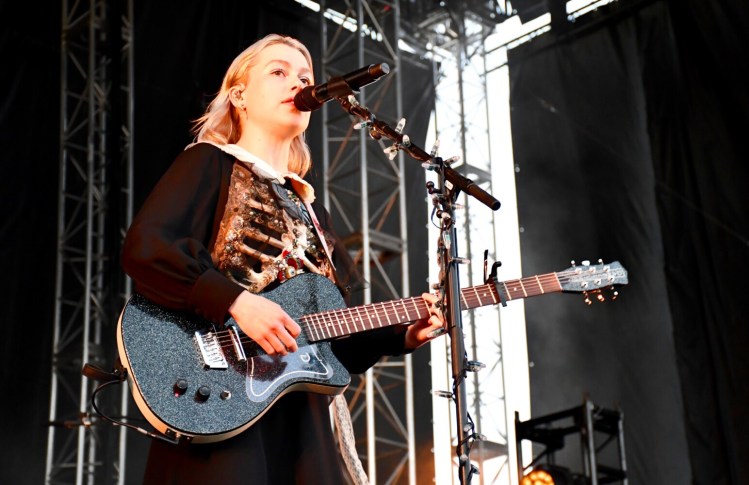School may be in session for another few days, but “sad girl summer” officially began on Thursday night with Phoebe Bridgers’ concert at Thompson’s Point. These were the kinds of terms used by some Bridgers fans on social media, along with comments about crying during the concert. And they were right: the performance felt cathartic and euphoric, sometimes both at once. For some fans, that shared emotional outlet is a crucial part of the Phoebe Bridgers experience; it’s part of the fun. Who doesn’t need some group therapy these days?
In the last five years, Bridgers has enjoyed a meteoric rise in popularity thanks in part to her ability to create such community around her work. She is an extraordinary songwriter, capable of unearthing small moments and describing them with vivid detail, transforming them from personal reflections into powerful, universal sentiments. Her singing evokes the wisdom of an old friend, and her compositions suffuse her words with an elegant melancholy.
She’s done it all with just two solo albums, and nothing that you might call a hit single. She’s become a huge draw, performed on “Saturday Night Live,” and later this month, she will be opening for the Rolling Stones. She sold out this Portland date in just a few hours, with fans driving from all over New England to see her only regional appearance. Incredibly, the line to buy souvenir merchandise before the concert looked to be more than 500 people deep.
Bridgers gave the audience what they came for right away, opening with her 2017 breakthrough song “Motion Sickness” (which loosely details her abusive former relationship with singer Ryan Adams). From there, her set primarily drew from her 2020 album “Punisher,” beginning with a handful of the album’s most-loved tracks, including the evocative “Garden Song” and the uptempo “Kyoto.” In front of a projected backdrop that colored her songs with book-like imagery, she displayed an easy-going assurance, even posing dramatically in front of a giant full moon in “Moon Song.”
Part of what makes her success so astonishing, particularly in the live setting, is how hushed her songs can be. Her songs frequently hang in the air like a whisper, similar to that of her songwriting hero, Elliott Smith. Unless you know her songs inside and out, they can require careful attention to the small pieces that form a larger collage. The audience gave these downtempo moments the reverent silence in which the songs could blossom, when they weren’t singing along or, during the breaks, screaming with Beatlemania-like fervor.
Playing such quiet songs before a massive audience requires an impeccable sound mix, and her crew, as well as that of Thompson’s Point, rose to this challenge. Her band’s bed of instrumentation sounded like new age music at times, and other times offered a hint of mournful country balladry, occasionally rising into galloping, indie-rock crescendos. Between the band’s skeleton costumes, the lyrical fixations on death and loneliness, and JJ Kirkpatrick’s funereal trumpet playing, it was also the most Gothic show to grace the Thompson’s Point stage in years.
Indeed, one of the evening’s highlights was “Halloween,” a song that was aborted and then restarted when Bridgers spotted a potential health emergency in the crowd. The song opens with lines about sirens at hospitals, a death at a stadium, and drinking while wearing masks (though the song was written before COVID, it has since resonated in different ways). The chorus however, offers the lines “Baby, it’s Halloween, and we can be anything,” turning the macabre imagery inside-out and into something profound and hopeful. Bridges may have prompted tears from some fans, but people cry when they’re happy, too.
Robert Ker is a freelance writer in Portland. He can be reached at bobzker@gmail.com.
Send questions/comments to the editors.



Success. Please wait for the page to reload. If the page does not reload within 5 seconds, please refresh the page.
Enter your email and password to access comments.
Hi, to comment on stories you must . This profile is in addition to your subscription and website login.
Already have a commenting profile? .
Invalid username/password.
Please check your email to confirm and complete your registration.
Only subscribers are eligible to post comments. Please subscribe or login first for digital access. Here’s why.
Use the form below to reset your password. When you've submitted your account email, we will send an email with a reset code.